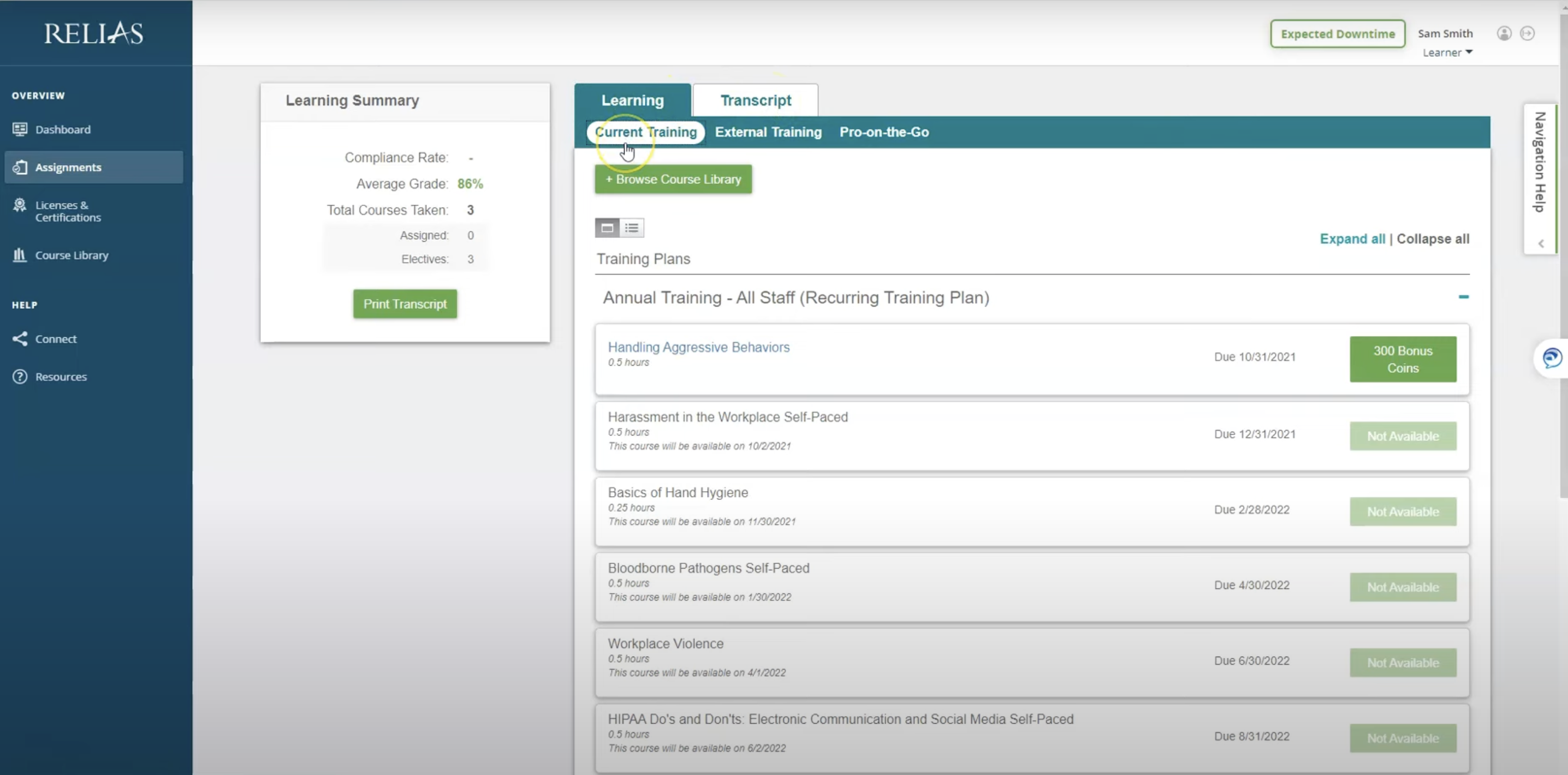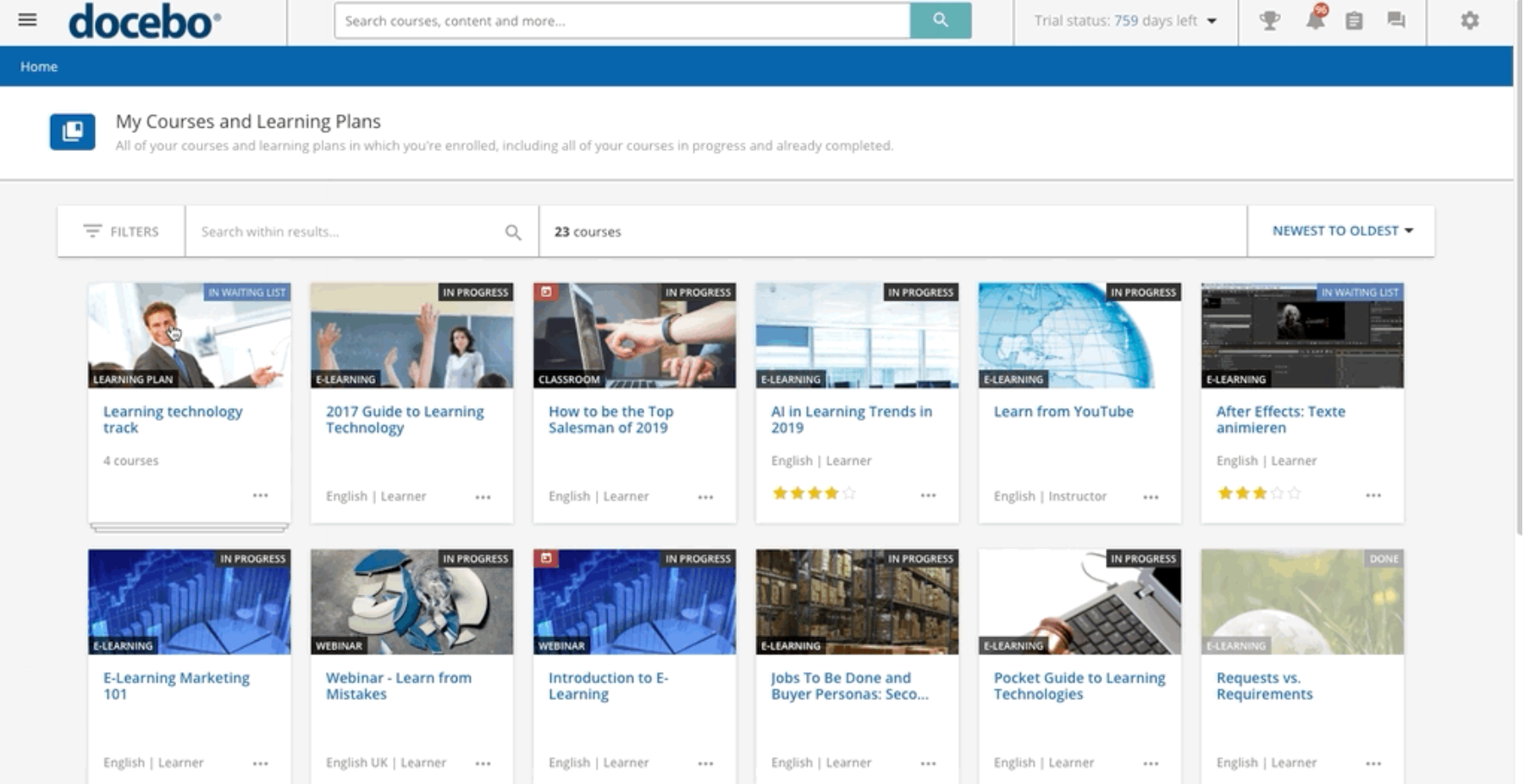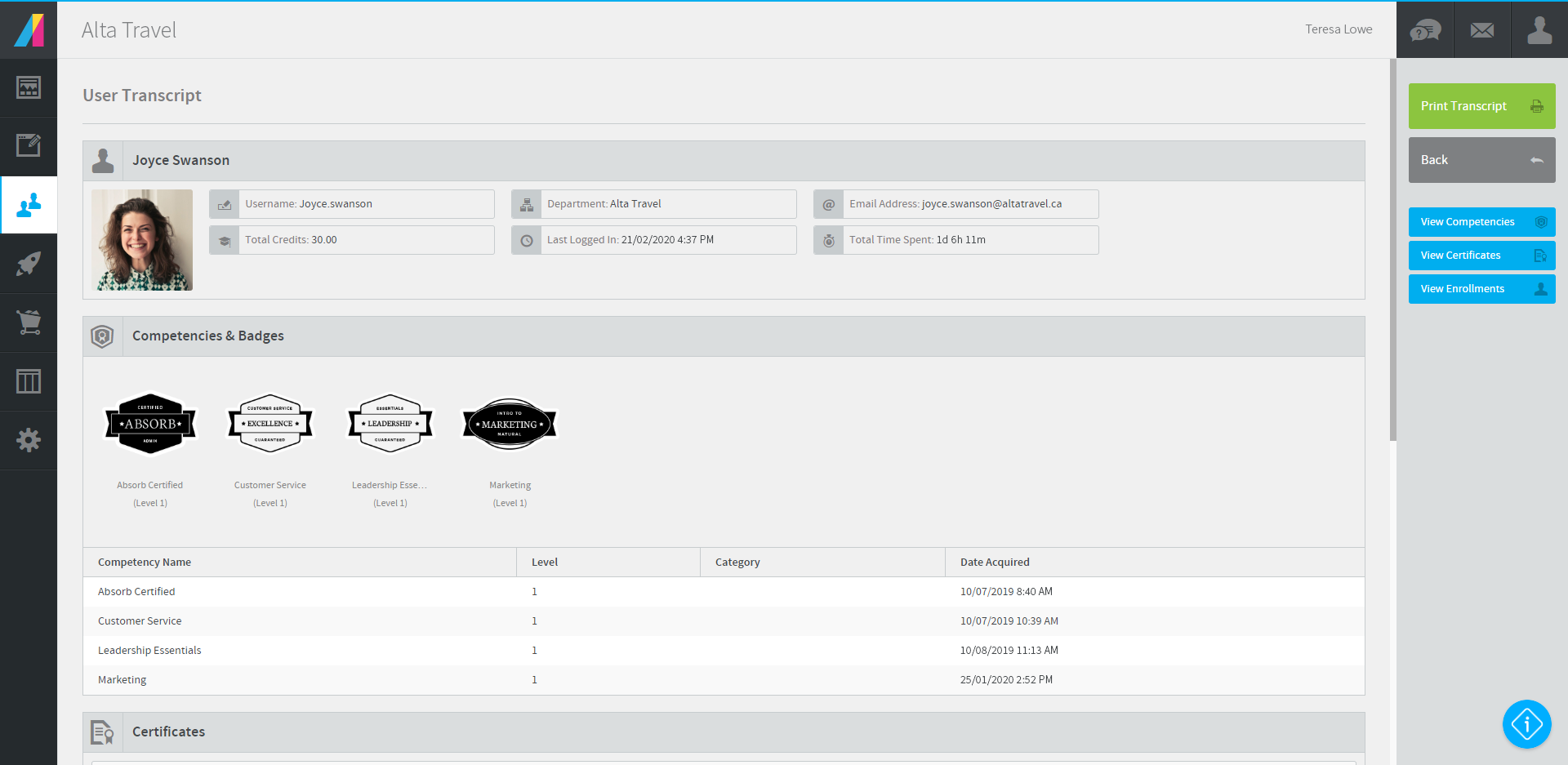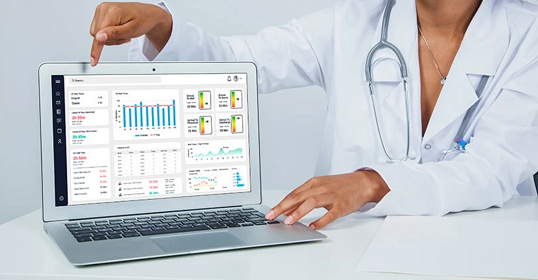As healthcare intricacy increases, the need for robust training and development becomes undeniable. Customized Learning Management Systems (LMSs) have emerged as essential tools for medical professionals to stay abreast of the latest advancements and regulatory nuances. While there are many ready-made options, a tailored LMS often resonates more closely with an organization's unique requirements. At Belitsoft, we craft modern, adaptable LMS frameworks for healthcare organizations focused on enhancing patient care through strategic training. For those in the training industry, our solutions offer an avenue to develop a standout product tailored to the healthcare sector. This article delves into the significance, benefits, challenges, and transformative potential of a custom healthcare LMS.
Essentially, a healthcare LMS is a dedicated learning platform. Hospitals, health tech, and medical device companies use it to provide training on healthcare industry standards, medical product and device usage, and other pertinent topics. Whether for HIPAA compliance exams, mastering novel equipment, or staying updated with regulatory changes, a healthcare LMS simplifies onboarding, continuous training, and certification processes.
Criteria for Finding Top Healthcare LMS
What to Teach: Comprehensive Course Catalog
A diverse course catalog that includes HIPAA, FDA, and OSHA compliance, specialized medical product instruction, and industry-sponsored CE/CME content is key to a good LMS.
Administrators can then select relevant courses and assign them to the appropriate group of medical professionals.
How to Teach: Personalized, Relevant Training
Not every course is suitable for all hospital employees. The assignment engine within the Learning Management System provides a solution enabling administrators to allocate courses based on specific criteria, such as department, job title, expertise, and proficiency levels.
Tailoring content to each participant's role and requirements, training becomes both meaningful and efficient.
How to Assess: Progress Tracking & Certification
Once training starts, it's essential for key stakeholders to monitor the learners' progress and completion rates. The LMS requires tools that reflect learners' performance, completion, certification, and compliance tracking.
These tools give your healthcare organization a data-driven edge in managing training programs and meeting industry benchmarks, including Medicare, Medicaid, CHIP, HIPAA, HITECH, FDA, GDPR, and the False Claims Act.
How to Improve Outcomes: Incorporating Advanced Features
But what happens if the training doesn't meet expectations? If courses aren't completed punctually, if talent retention programs are ineffective, or if onboarding lags? A versatile LMS will offer advanced features and analytics to identify these issues, allowing for timely interventions and adjustments.
To significantly enhance learning effectiveness in the healthcare industry, we can integrate the following features into your LMS:
- Gamification. We integrate game-design elements into non-gaming contexts. Examples include awarding points for completed lessons, introducing a leaderboard, or unlocking extra levels upon course completion. Research has shown gamification helps improve learning outcomes, increase precision, and motivate the learners to excel—metrics that can directly impact patient care and save lives. We use our years of eLearning expertise to help in choosing and implementing gamification elements that will work in each individual case. For more information on gamification and its applications, refer to our relevant articles: Gamification in eLearning and Gamification in Healthcare.
- AI-powered Chatbots. Our team integrates AI-driven chatbots into your LMS to provide instant learner support, answer queries, and guide learners through their training journey. Chatbots enhance accessibility and efficiency by offering immediate assistance whenever needed.
- Social Learning. We help foster collaborative learning experiences by integrating social learning features into your LMS. This enables learners to share insights, collaborate on projects, and engage in discussions, creating a dynamic and enriching educational environment.
- Microlearning Modules. We recommend breaking down complex concepts into bite-sized modules that can be consumed on demand. Medical professionals can work toward their continuing medical education credits during moments, such as a traffic jam, morning commute, or any available 5-10 minute window. Microlearning promotes knowledge retention, making learning accessible and manageable, even for busy schedules.
- Real-world Simulations. Using VR and AR to simulate real-world scenarios for practical training is one of the top eLearning trends. Learners can apply their knowledge in a controlled environment, boosting their confidence and readiness for actual situations.
Key Healthcare LMS Features
Security & Compliance
When it comes to your healthcare Learning Management System (LMS), we understand that safeguarding patient data and ensuring regulatory compliance are non-negotiable priorities. Our team ensures security and adherence to standards at every juncture.
- We strictly adhere to regulations, like the Health Insurance Portability and Accountability Act (HIPAA) in the U.S.
- Data segmentation, audit trails, and secure user authentication mechanisms are implemented to preserve patient data confidentiality.
- Our system includes secure file uploads, encrypted messaging, and role-based training to guard against unauthorized access and potential data breaches.
We also believe in a multi-faceted approach to security. This includes data encryption, access control, and user authentication. Through regular audits and assessments, secure hosting, and data minimization practices, we maintain a vigilant defense against potential threats. Moreover, robust data backup and recovery strategies, compliance with regional regulations, and a well-structured incident response plan add an extra layer of security to the LMS.
eLearning Standards Compatibility
Unlike EHR/EMR systems, where interoperability is a problem that is still hard to solve, LMSs have the edge with unified eLearning standards simplifying data exchange. We apply:
- SCORM to standardize learning content formats
- xAPI for communicating data about learning activities among different systems, not just LMSs
- LTI to plug-and-play external learning content, software, tools, and more
One significant advantage of these standards is the accessibility of learning materials. If your LMS is SCORM-compatible, for example, adding a SCORM-packaged course becomes a matter of a few clicks.
Another benefit lies in advanced tracking capabilities. The versatility of xAPI, for instance, is evident in its wide-ranging monitoring and reporting features. An example of its utility is MedStar Health's initiative, where they employed xAPI to track resuscitation medic training, connecting it to apps, including a defibrillator simulator.
Mobile support
Healthcare professionals have diverse technological preferences, so it's important to make content available on various platforms. While many still rely on desktop setups, the growing trend leans towards mobile devices like smartphones for convenience.
Here, the Learning Management System steps in by providing content that is accessible across a spectrum of devices and platform types, including iOS, Windows, and Android.
This flexibility ensures that healthcare personnel can access training materials in sync with their preferred learning styles and habits.
Integrations
Integrating an LMS with third-party tools and applications via APIs brings considerable benefits.
For instance, embedding the LMS with EHR software provides contextual training during patient record evaluations, promoting informed clinical decisions.
Similarly, integrating with healthcare CRM systems and patient portals, we provide a consolidated ecosystem that offers immediate access to patient-specific educational materials and treatment protocols.
API-driven integrations personalize the learning experience and extend the LMS's scope beyond healthcare training, empowering medical professionals with real-time information and elevating patient care.
3 Best Learning Management Systems for Healthcare in 2023
Based on G2 reviews, we'll list the top 3 healthcare LMS solutions in 2023.
Relias
Review Rating: 3.9/5 from 345 reviews
Pricing: Сustom quote on demand, reportedly starting at $25 per license
Relias assists organizations in addressing knowledge gaps with over 5,000 courses. Topics span from central sterile processes to wound assessment, with regular checks by 135+ accrediting bodies for compliance.
Drawbacks: Some G2 users find the interface cumbersome and report issues like interrupted course playback. The video courses lack captioning, and there are inconsistencies in Relias' mobile applications.
Users have also mentioned the system's limited interoperability, especially when importing courses and data.

Docebo
Review Rating: 4.4/5 from 366 reviews
Pricing: From $1,600/month ($19,200 annually) per PC
Docebo, suitable for expanding mid-to-large healthcare organizations, especially those undergoing expansion. While it doesn't focus exclusively on healthcare, it offers 80,000+ courses, blending general with healthcare-specific content, accessible across mobile and desktop devices.
Drawbacks: Its vast range of features requires a learning curve, especially for non-tech savvy users or those unfamiliar with LMS platforms. Some LMS administrators have mentioned that it took them a month to become proficient with the platform.
Like most ready-to-use solutions, Docebo comes with restrictions, including limited widgets and notification types, affecting user experience.

Absorb LMS
Review Rating: 4.7/5 from 239 reviews
Pricing: From $800/month ($9,600 annually) with an added $16 per active user annually.
Absorb presents a cloud-based enterprise learning platform specifically designed for the healthcare industry. This platform equips clinicians with training, offers intelligent reporting tools for performance tracking, personalizes learning paths, and incorporates tests and assessments.
The platform is flexible, allowing for tailored user experiences. Users can choose between mandatory or optional courses, while administrators gain insights into course completions and evaluations. Plus, Absorb supports extensive integrations with third-party software like Okta, Salesforce, and Zoom.
Drawbacks: Large organizations should be cautious when considering Absorb. The vendor charges for every active user, which can result in significant costs, especially for larger companies. Some users have reported annual expenses reaching up to $25,000 under the Enterprise plan.
In addition, limited API integrations have been flagged as a concern for those aiming to establish a robust system network within their enterprise.

Ready-Made vs. Custom LMS for Healthcare
The healthcare sector has an array of LMS choices. While some might lean towards off-the-shelf solutions, there are compelling reasons to consider custom-made products:
- 100% match with your company's and patients' specifics. Ready-made healthcare LMS platforms aim to cater to a vast audience across various industries and scales. This broad focus often results in generalized systems that don't cater to individual companies and patients, which is a concern for most users. As a result, your training becomes less effective.
- Prioritizing and managing patient data security. The healthcare industry requires rigorous data protection standards. With a custom LMS, healthcare providers can implement bespoke security measures, encryption techniques, and access controls that comply with regulations like HIPAA. Such a proactive approach facilitates quicker responses to threats, allows for comprehensive security audits, and ensures smooth integration with existing systems — all while upholding patient confidentiality.
- Long-term cost savings through license fee elimination, reduced customization expenses, and streamlined integration and scalability at no extra cost. A customized LMS boosts training efficiency, lowers support and maintenance costs, and adapts to industry changes, resulting in improved ROI and patient care.
- Potential for commercialization. Building a custom LMS often stems from the inability of ready-made solutions to address specific needs. Your solution may interest other organizations with similar requirements. A proprietary LMS, with its unique branding, user experience, and features, can therefore become a valuable commodity in the market.
Belitsoft Expertise in Action: UK Medical Practitioner Case
Countries such as the USA, UK, and Canada mandate continuous learning for healthcare professionals. As a provider of both custom healthcare software development and LMS development services, we have created many similar products.
Take, for example, our collaboration with a UK-based dentist. He sought creating a custom LMS for dental professionals, aiming to enhance their expertise, stay current with the industry, and effortlessly fulfill continuous education needs.
Here's how we shaped his vision:
- Content Selection: We created an LMS with diverse dental courses, ranging from cutting-edge technologies to industry regulations.
- Personalized Learning: We tailored learning pathways to address the unique needs of dental professionals, leading to impactful learning outcomes.
- Progress Tracking: We integrated sophisticated tools for progress monitoring and evaluations, ensuring practitioners could monitor their growth and stay compliant.
- Enhanced User Experience: We emphasized usability, providing a sleek interface, clear navigation, and interactive features for effective learning.
Belitsoft offers support beyond LMS creation and helps clients with various challenges:
- Custom LMS Development. If none of the existing LMSs fit your requirements, we develop a new one from scratch aligned with your specific requirements.
- LMS Customization. To modify an open-source LMS, we add the features you require or adapt the UI to fit your brand.
- Course Creation. According to your request, we produce educational content across a spectrum—from lectures to simulations and learning games.
- Consulting. With 17 years in eLearning and over 5 in healthcare, we guide you in LMS choices, training structuring, and data protection.
How We Create an Effective, Competitive LMS for Healthcare: Our Time-Tested Approach
Stakeholder collaborating
Engaging with stakeholders offers a comprehensive understanding of your organization's multifaceted needs. This includes technical necessities, operational considerations, and user-centric requirements. This collaborative approach ensures that our custom LMS solution is not only technically robust but also aligns seamlessly with your healthcare organization's objectives, compliance requirements, and user expectations.
To grasp the diverse needs of your organization, we engage with stakeholder groups:
- System Administrators & Technical Support. Vital for daily software operations, their insights guide the technical and user experience aspects.
- Heads of Business Areas. Their input ensures alignment with corporate policies, compliance mandates, and branding. corporate policies, ensuring compliance, security, and consistent branding.
- Users (Medical Professionals). Direct user feedback is invaluable for tailoring user-centric features.
Defining Key Functionalities
An effective LMS is defined by its features. Our approach ensures a solution that meets business, user, technical, and security needs. Key functionalities might encompass:
- compliance with recent standards like AODA & WCAG,
- multilingual support
- advanced user privacy and security
For existing LMS upgrades, we:
- examine the current system's alignment with business, technical, and security needs
- investigate evolving software trends in the niche and evaluate available solutions
- understand the software tools utilized by comparable organizations
Developing an MVP
With a clear grasp of needs and potential challenges, we define priorities for the development phase.
Typically, this entails starting with a Minimum Viable Product (MVP) that houses the most essential features. This strategy ensures quick deployment, early user feedback, and forms a basis for future enhancements.
Create training that perfectly fits professionals' busy schedules and brings notable results.
Let's discuss the ideas.
Frequently Asked Questions
A LMS for healthcare is a platform used for the education or development of medical personnel. The platform provides training to improve the knowledge and skills of the healthcare workforce to use technology and to meet compliance requirements.
1. Timely and automated accreditation and certification
Healthcare professionals require current certifications for both compliance and quality care. Manually managing these can divert resources away from patient care. A healthcare LMS offers solutions by automating renewal reminders, tracking expiration dates, centralizing credentials, and integrating with accrediting entities.
2. Alleviating overwork and high attrition
80% of US doctors work at or beyond capacity, and 78% experience burnout. This leads about 2% of US physicians to contemplate leaving their profession.
“EHRs contribute to burnout by turning physicians into unhappy data-entry clerks,” Dr. Robert Wachter, professor and chair of the department of medicine at the University of California, San Francisco.
To motivate and retain key professionals, empower them to stay current with medical advancements and best practices without straining their already demanding routines. A healthcare learning management system allows doctors to access training materials, courses, and updates at their convenience, fostering a culture of continuous learning.
Furthermore, a comprehensive healthcare learning management system can offer microlearning modules and mobile-friendly content that can be consumed in short, convenient bursts, such as during breaks or commutes. This approach makes it easier for doctors to fit learning into their day-to-day tasks.
3. Poor patient care
According to a study published by The Johns Hopkins Medicine team in the British Medical Journal (BMJ), medical errors are estimated to be the third leading cause of death in the United States. Additionally, a report by the World Health Organization (WHO) states that unsafe care contributes to millions of adverse events annually, leading to significant suffering and financial losses.
The challenges of poor patient care extend beyond immediate health consequences. The cost of managing complications arising from poor care places a burden on healthcare systems and resources, affecting both patients and institutions.
By equipping healthcare professionals with comprehensive, up-to-date knowledge and skills through advanced learning methodologies and advanced healthcare learning management systems, the industry can work towards mitigating the risks associated with poor patient care.
4. The challenge of medical product and device education
Unlike clinical education aimed at healthcare professionals (HCPs), medical product and device education targets those relying on sound product knowledge to enhance customer experiences and boost sales.
This education includes courses covering product demonstrations, highlighting the value and selling points of innovations like artificial cardiac pacemakers.
Advanced healthcare Learning Management Systems offer accessible resources to sellers and address the challenge of consistent, up-to-date, and location-independent education. As medical products and devices evolve, the LMS equips teams with the knowledge needed to excel in selling and delivering exceptional customer experiences.
Rate this article
Recommended posts
Portfolio


Our Clients' Feedback






















.jpg)
.jpg)
.jpg)













Belitsoft has been the driving force behind several of our software development projects within the last few years. This company demonstrates high professionalism in their work approach. They have continuously proved to be ready to go the extra mile. We are very happy with Belitsoft, and in a position to strongly recommend them for software development and support as a most reliable and fully transparent partner focused on long term business relationships.
Global Head of Commercial Development L&D at Technicolor